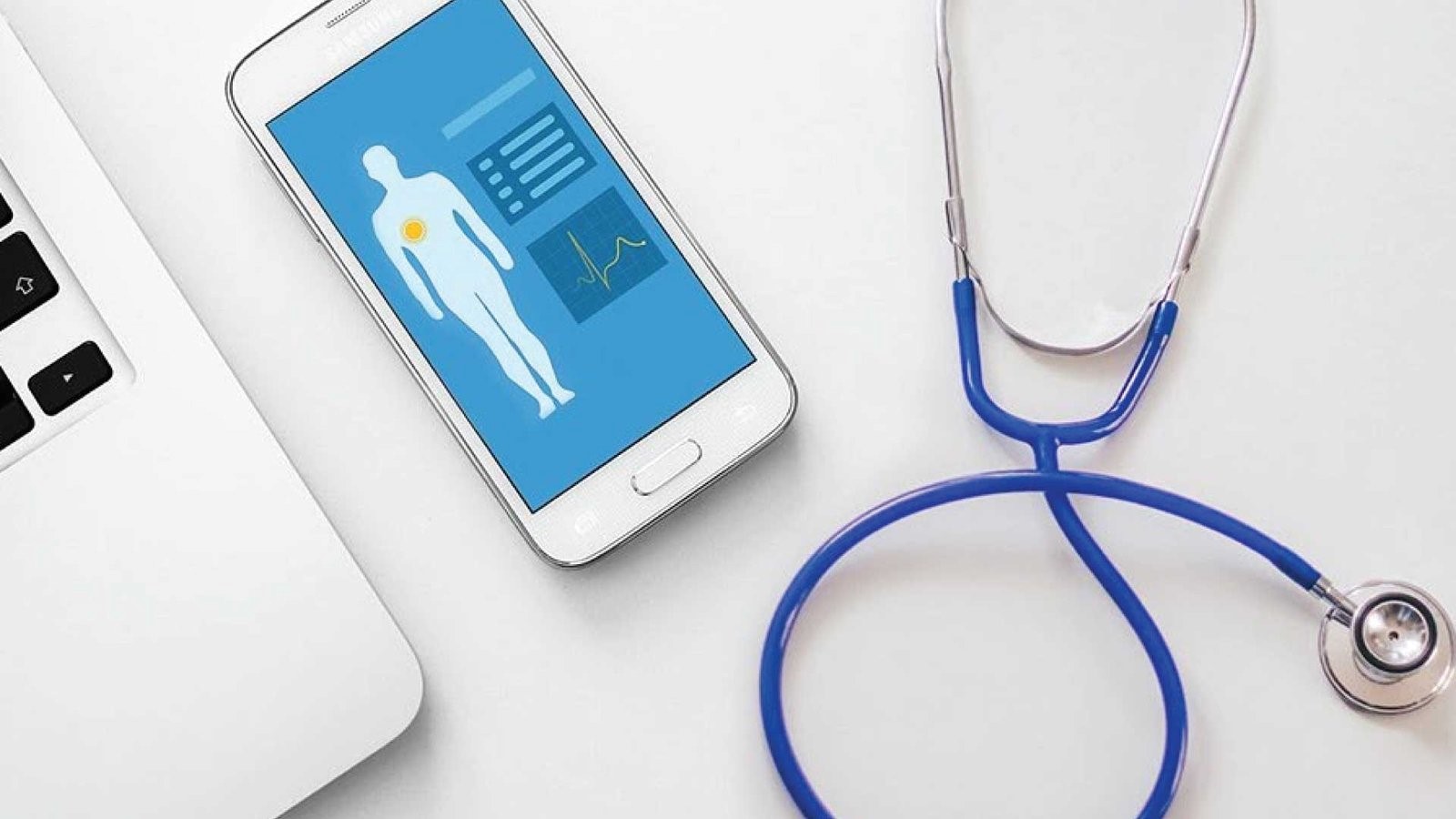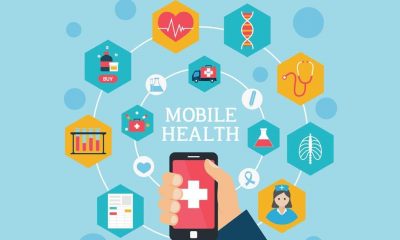health
The Role of Mobile Health Apps in Preventive Care

In recent years, the proliferation of mobile health apps has revolutionized the healthcare landscape, particularly in the realm of preventive care. These digital tools, accessible via smartphones and tablets, offer a myriad of functionalities that empower individuals to take a proactive approach to their health. From tracking physical activity and monitoring vital signs to providing educational resources and facilitating communication with healthcare providers, mobile health apps have become indispensable in the quest for better health outcomes.
The Rise of Mobile Health Apps
The advent of mobile health apps can be traced back to the broader digital health movement, which seeks to leverage technology to improve healthcare delivery and patient outcomes. According to a report by Grand View Research, the global mobile health market is expected to reach $311.98 billion by 2027, growing at a compound annual growth rate (CAGR) of 29.2% from 2020 to 2027. This growth is driven by several factors, including the increasing penetration of smartphones, the rising prevalence of chronic diseases, and the growing demand for remote healthcare services.
Key Features of Mobile Health Apps
Mobile health apps come with a variety of features designed to support preventive care. Some of the most common functionalities include:
1. Activity Tracking
Many mobile health apps offer activity tracking features that allow users to monitor their physical activity levels. These apps can track steps, distance traveled, calories burned, and even specific types of exercises like running, cycling, or swimming. By providing real-time feedback, these apps encourage users to stay active and meet their fitness goals.
2. Vital Sign Monitoring
Some advanced mobile health apps can monitor vital signs such as heart rate, blood pressure, and blood glucose levels. These apps often integrate with wearable devices like smartwatches and fitness bands to provide continuous monitoring. This data can be invaluable for detecting early signs of health issues and taking preventive measures.
3. Medication Reminders
Adherence to prescribed medication regimens is crucial for managing chronic conditions and preventing complications. Mobile health apps can send reminders to take medications, refill prescriptions, and schedule medical appointments. This feature is particularly beneficial for elderly patients and those with multiple medications.
4. Educational Resources
Access to reliable health information is a cornerstone of preventive care. Mobile health apps often include educational resources such as articles, videos, and interactive tools that provide users with evidence-based information on various health topics. This empowers individuals to make informed decisions about their health and adopt healthier lifestyles.
5. Telehealth Services
The COVID-19 pandemic has accelerated the adoption of telehealth services, and many mobile health apps now offer virtual consultations with healthcare providers. This feature enables users to seek medical advice, receive diagnoses, and obtain prescriptions without having to visit a healthcare facility. Telehealth services are particularly useful for preventive care, as they allow for early intervention and continuous monitoring.

Picture by: Yandex.com
Benefits of Mobile Health Apps in Preventive Care
The integration of mobile health apps into preventive care strategies offers several benefits:
1. Personalized Health Management
Mobile health apps provide personalized health management by tailoring recommendations and interventions based on individual user data. This personalized approach enhances the effectiveness of preventive measures and increases user engagement.
2. Increased Accessibility
Mobile health apps make preventive care more accessible by eliminating geographical and logistical barriers. Individuals can access health information, track their progress, and communicate with healthcare providers from the comfort of their homes.
3. Cost-Effective Solutions
By promoting early detection and intervention, mobile health apps can reduce the need for expensive medical treatments and hospitalizations. This not only lowers healthcare costs for individuals but also alleviates the financial burden on healthcare systems.
4. Enhanced Patient Engagement
Mobile health apps foster greater patient engagement by involving individuals in their own health management. Features like goal setting, progress tracking, and gamification motivate users to take an active role in their health and adhere to preventive measures.
5. Data-Driven Insights
The data collected by mobile health apps can provide valuable insights into population health trends and inform public health strategies. Healthcare providers and policymakers can use this data to identify at-risk populations, monitor the effectiveness of preventive programs, and allocate resources more efficiently.
Challenges and Considerations
While mobile health apps offer numerous benefits, there are also challenges and considerations to address:
1. Privacy and Security
The collection and storage of sensitive health data raise concerns about privacy and security. Developers and healthcare providers must ensure that mobile health apps comply with regulations such as the Health Insurance Portability and Accountability Act (HIPAA) and implement robust security measures to protect user data.
2. Digital Literacy
The effectiveness of mobile health apps depends on users’ digital literacy. Efforts must be made to ensure that all individuals, regardless of age or technological proficiency, can navigate and utilize these apps effectively.
3. Integration with Healthcare Systems
For mobile health apps to be truly effective, they must be integrated with existing healthcare systems. This requires interoperability between different platforms and seamless data sharing between apps and electronic health records (EHRs).
4. Evidence-Based Design
The design and development of mobile health apps should be grounded in evidence-based practices. Collaboration with healthcare professionals and researchers is essential to ensure that the apps provide accurate information and effective interventions.
5. User Engagement and Retention
Sustaining user engagement over the long term can be challenging. Developers must continuously update and improve their apps to keep users motivated and engaged. Features like personalized feedback, social support, and rewards can help maintain user interest.
Conclusion
Mobile health apps have emerged as powerful tools in the realm of preventive care, offering personalized, accessible, and cost-effective solutions for health management. By leveraging features such as activity tracking, vital sign monitoring, medication reminders, educational resources, and telehealth services, these apps empower individuals to take control of their health and make informed decisions.
However, to fully realize the potential of mobile health apps, it is essential to address challenges related to privacy, digital literacy, integration with healthcare systems, evidence-based design, and user engagement. By overcoming these hurdles, mobile health apps can play a pivotal role in transforming preventive care and improving health outcomes for individuals and communities alike.
Beauty Fitness
Liposuction in Riyadh: Your Complete Guide to Body Contouring

If you’ve been struggling with stubborn fat that doesn’t respond to diet and exercise, you’re not alone. Many people explore Liposuction in Riyadh as a reliable and medically supervised way to refine body contours and achieve a more sculpted appearance.
While liposuction is one of the most popular cosmetic procedures worldwide, beginners often have questions about how it works, who it’s for, and what results to realistically expect. This guide outlines all the essential information you should understand in a straightforward, beginner-oriented manner.

What Is Liposuction?
Liposuction is a cosmetic surgical procedure designed to remove localized fat deposits from specific areas of the body to improve shape and proportion. It is not a weight-loss solution but rather a body contouring treatment that targets fat resistant to lifestyle changes. Common treatment areas include the abdomen, thighs, hips, arms, back, and chin. The procedure involves inserting a thin tube called a cannula beneath the skin to suction out excess fat, permanently removing fat cells from the treated area and creating a smoother silhouette.
Liposuction vs. Weight Loss
A common misconception is that liposuction is a substitute for weight loss. In reality, liposuction is designed for body sculpting, not obesity treatment. Key differences include:
- Liposuction removes targeted fat cells
- Weight loss shrinks fat cells throughout the body
- Liposuction enhances contour and shape
- Weight loss improves overall health metrics
Maintaining a healthy diet and exercise routine after the procedure is essential to preserve results and prevent remaining fat cells from expanding.
Your Skin Has Good Elasticity
Skin elasticity plays a significant role in achieving smooth and natural-looking results after fat removal. When fat cells are removed, the skin must retract and adapt to the new contour. Good candidates typically:
- Have firm, elastic skin
- Show minimal sagging in the treatment area
- Are not dealing with significant loose skin
If skin laxity is severe, additional procedures such as skin tightening or excisional surgery may be recommended alongside liposuction for optimal results.
You Are in Good Overall Health
General health is an essential factor in determining candidacy for any surgical procedure. Liposuction candidates should:
- Be free from uncontrolled chronic conditions
- Not have serious heart or lung disease
- Be non-smokers or willing to stop smoking before surgery
- Have no active infections
A thorough medical evaluation ensures that you can safely undergo the procedure and recover without complications. Being in good health also promotes faster healing and better outcomes.
You Have Realistic Expectations
Understanding what liposuction can and cannot achieve is crucial. It can significantly improve body contours, but it won’t completely transform your body or eliminate cellulite. Good candidates:
- Understand liposuction is body sculpting, not weight loss
- Expect improvement rather than perfection
- Are mentally prepared for recovery time
- Recognize that results take time as swelling subsides
Clear communication with your surgeon during consultation helps align expectations with achievable outcomes.
You Are Committed to Maintaining Results
Liposuction permanently removes fat cells from treated areas, but remaining fat cells can expand with weight gain. Long-term success depends on maintaining a healthy lifestyle. Ideal candidates are prepared to:
- Follow a balanced, nutritious diet
- Stay physically active
- Maintain a stable weight
- Attend follow-up appointments
Patients considering Liposuction in Riyadh often find that achieving their desired contour motivates them to continue healthy habits long after recovery.
You Want to Enhance Body Contours, Not Drastically Change Your Body:
Liposuction is best suited for contour enhancement rather than dramatic reshaping. It refines proportions and creates smoother transitions between areas of the body. You may be a strong candidate if:
- You want more definition in specific areas
- You aim to improve body symmetry
- You desire better-fitting clothing
- You seek subtle but noticeable contour improvements
This mindset leads to higher satisfaction rates, as patients appreciate gradual refinement rather than expecting extreme transformations.
Maintaining Your Results
The long-term success of liposuction largely depends on lifestyle habits. While removed fat cells do not return, remaining fat cells can enlarge with weight gain. To maintain results:
- Follow a balanced, nutrient-rich diet
- Engage in regular physical activity
- Stay hydrated
- Attend follow-up appointments as advised
- Maintain a stable weight
Many patients find that seeing improved contours motivates them to adopt healthier habits for lasting benefits.
Choosing the Right Provider
Selecting the right surgeon plays a critical role in achieving safe and natural-looking results. Look for a board-certified plastic surgeon with experience in body contouring procedures. During your consultation, ask about:
- Qualifications and certifications
- Before-and-after photos
- Surgical techniques used
- Recovery expectations
- Potential risks
If you’re exploring Liposuction in Riyadh, prioritize clinics that emphasize patient safety, transparent communication, and personalized treatment plans.
How Liposuction Works
Liposuction works by breaking down and extracting fat cells from targeted areas using specialized techniques. Depending on the method used, fat may be loosened with a tumescent solution, ultrasound energy, or laser technology before removal. The basic steps typically include:
- Administering anesthesia for comfort
- Making small, discreet incisions
- Inserting a cannula to loosen fat
- Suctioning out the fat cells
- Closing the incisions and applying compression garments
Once fat cells are removed, they do not regenerate, but maintaining results requires a stable weight and healthy lifestyle.
Who Is a Good Candidate?
An ideal candidate for liposuction is someone close to their target weight but dealing with stubborn fat pockets that don’t respond to exercise. Candidates should be in good overall health, have firm skin with good elasticity, and hold realistic expectations about the outcome. Liposuction is best suited for body contouring rather than dramatic weight reduction. Individuals with significant skin laxity or certain medical conditions may require alternative or additional procedures to achieve optimal results.
Areas Commonly Treated
Liposuction can be performed on multiple areas of the body, allowing for customized treatment plans tailored to individual goals. Frequently treated areas include:
- Abdomen and waist (love handles)
- Thighs (inner and outer)
- Arms
- Back and bra line
- Chin and neck
- Hips and flanks
Some patients choose to treat multiple areas in one session, depending on safety guidelines and surgeon recommendations.
Types of Liposuction Techniques
Advancements in cosmetic surgery have introduced various liposuction techniques designed to improve precision and recovery. The most common types include:
- Tumescent liposuction: Uses a medicated solution to reduce bleeding and discomfort
- Ultrasound-assisted liposuction (UAL): Uses sound waves to liquefy fat
- Laser-assisted liposuction: Uses laser energy to break down fat and may promote mild skin tightening
- Power-assisted liposuction (PAL): Uses a vibrating cannula for easier fat removal
Each method has its advantages, and the right choice depends on the treatment area, patient goals, and surgeon expertise.
What to Expect During Recovery
Recovery varies depending on the extent of the procedure and the areas treated. Most patients experience swelling, bruising, and mild discomfort in the first few days. Compression garments are typically worn to reduce swelling and help the body adapt to its new contours. General recovery expectations include:
- Returning to light activities within a few days
- Resuming normal routines within 1–2 weeks
- Gradual reduction of swelling over several weeks
- Final results becoming visible after a few months
Following post-operative instructions carefully is essential for optimal healing and long-lasting results.
Benefits of Liposuction
Liposuction offers both physical and psychological benefits for suitable candidates. While results vary, many patients report:
- Improved body proportions
- Enhanced clothing fit
- Boosted self-confidence
- Long-lasting fat reduction in treated areas
- More defined body contours
For individuals considering Liposuction in Riyadh, choosing a qualified and experienced medical provider is crucial to achieving safe and satisfying results.
Risks and Considerations
Like any surgical procedure, liposuction carries potential risks. Although complications are uncommon when performed by a skilled professional, it’s important to understand possible side effects, such as swelling, bruising, contour irregularities, or temporary numbness. Serious complications are rare but may include infection or fluid accumulation. A thorough consultation and honest discussion of medical history significantly reduce these risks and ensure appropriate candidacy.
Liposuction vs. Weight Loss
A common misconception is that liposuction is a substitute for weight loss. In reality, liposuction is designed for body sculpting, not obesity treatment. Key differences include:
- Liposuction removes targeted fat cells
- Weight loss shrinks fat cells throughout the body
- Liposuction enhances contour and shape
- Weight loss improves overall health metrics
Maintaining a healthy diet and exercise routine after the procedure is essential to preserve results and prevent remaining fat cells from expanding.
Maintaining Your Results
The long-term success of liposuction largely depends on lifestyle habits. While removed fat cells do not return, remaining fat cells can enlarge with weight gain. To maintain results:
- Follow a balanced, nutrient-rich diet
- Engage in regular physical activity
- Stay hydrated
- Attend follow-up appointments as advised
- Maintain a stable weight
Many patients find that seeing improved contours motivates them to adopt healthier habits for lasting benefits.
Choosing the Right Provider
Selecting the right surgeon plays a critical role in achieving safe and natural-looking results. Look for a board-certified plastic surgeon with experience in body contouring procedures. During your consultation, ask about:
- Qualifications and certifications
- Before-and-after photos
- Surgical techniques used
- Recovery expectations
- Potential risks
If you’re exploring Liposuction in Riyadh, prioritize clinics that emphasize patient safety, transparent communication, and personalized treatment plans.
Final Thoughts:
Liposuction is a powerful body contouring solution for individuals seeking to refine their shape and address stubborn fat deposits. Understanding how the procedure works, who it’s suitable for, and what recovery involves helps set realistic expectations and ensures informed decision-making.
While not a weight-loss shortcut, liposuction can significantly enhance body proportions and confidence when combined with a healthy lifestyle. By choosing a qualified provider and following proper aftercare, patients can enjoy long-lasting, natural-looking results that support both aesthetic goals and overall well-being.
Consumer Services
Healthcare Documentation: Exploring Medical Scribe Services

In the ever-evolving healthcare landscape, accurate and timely documentation is crucial. Physicians face growing administrative burdens, reducing the time they can spend with patients. Medical scribe services provide a solution, enhancing efficiency while maintaining high-quality records.
From traditional human scribe support to advanced AI medical scribe technologies and flexible virtual medical scribe services, healthcare providers can streamline their operations and focus on patient care. Additionally, virtual medical scribe companies and tele scribe solutions offer scalable options for practices of any size.
This article explores medical scribe services, virtual medical scribe, tele scribe, human vs AI scribe, and virtual medical scribe companies, helping healthcare providers choose the best documentation solution.

What Are Medical Scribe Services?
Medical scribe services involve trained professionals who assist physicians by documenting patient encounters accurately and efficiently. This reduces administrative workload, improves record quality, and enhances workflow efficiency.
Benefits of Medical Scribe Services
- Accurate and detailed documentation
- Faster patient charting and billing
- Reduced physician burnout
- Increased time for patient interaction
A medical scribe for physicians ensures that every encounter is documented according to healthcare standards, improving both patient care and compliance.
Virtual Medical Scribe Services
Virtual medical scribe services allow documentation to be performed remotely. This is ideal for telemedicine, multi-location practices, and physicians seeking flexible support without on-site staff.
Advantages of Virtual Medical Scribe
- Real-time remote documentation
- Integration with electronic health records (EHR)
- Flexible staffing schedules
- Cost-effective for smaller or expanding practices
Partnering with reputable virtual medical scribe companies ensures secure, accurate, and compliant documentation services.
Tele scribe: Real-Time Remote Documentation
Tele scribe provides live documentation support during patient consultations, especially beneficial for telehealth or multi-provider practices.
Key Benefits of Tele scribe
- Immediate, accurate charting during patient visits
- Support for multiple physicians simultaneously
- Reduced backlog in medical records
- Seamless integration with existing EHR systems
Tele scribe improves workflow efficiency, allowing physicians to focus on patient care instead of administrative tasks.
Human Scribe: Personalized Support
A human scribe brings a level of understanding, flexibility, and insight that automated solutions cannot fully replicate.
Why Human Scribe Is Valuable
- Context-aware documentation
- Personalized note-taking for complex cases
- Adaptable to specialty-specific documentation
- Enhanced collaboration with physicians and staff
Human scribes are particularly useful in high-complexity specialties such as cardiology, neurology, and surgical practices.
AI Medical Scribe: Streamlined Automation
An AI medical scribe uses artificial intelligence to document patient interactions efficiently. AI scribes analyze speech, extract key clinical information, and generate accurate notes.
Advantages of AI Medical Scribe
- Fast and standardized documentation
- Scalable solution for high-volume practices
- Reduced administrative workload
- Improved consistency in patient records
Combining AI medical scribe with human review can create a hybrid model, offering both speed and contextual accuracy.
Human vs AI Scribe: Choosing the Right Option
Understanding the differences between human vs AI scribe is essential for healthcare providers.
| Feature | Human Scribe | AI Medical Scribe |
|---|---|---|
| Personalization | High | Moderate |
| Real-Time Support | Yes | Partial |
| Contextual Understanding | Strong | Moderate |
| Scalability | Moderate | High |
| Workflow Adaptability | High | Moderate |
Many practices opt for a hybrid model that combines the contextual strengths of human scribes with the speed of AI.
Top Virtual Medical Scribe Companies
Selecting the right virtual medical scribe company ensures reliable and secure documentation. Key considerations include:
- Experience and expertise in healthcare
- EHR integration capabilities
- Service options (human, AI, or hybrid)
- Cost-effectiveness
The best virtual medical scribe companies offer seamless documentation, compliance assurance, and scalable support for growing practices.
Comparison of Scribe Options
| Scribe Type | Key Benefits | Ideal Use Case |
|---|---|---|
| Human Scribe | Personalized, context-aware | Complex medical cases |
| AI Medical Scribe | Fast, standardized | High-volume clinics |
| Virtual Medical Scribe | Flexible, remote | Telemedicine and multi-location practices |
| Tele scribe | Live remote documentation | Real-time telehealth or multiple providers |
Hybrid solutions combining these options are becoming increasingly popular for optimizing workflow.
Future of Medical Scribe Services
The medical scribe industry continues to evolve with technological advancements:
- Expansion of virtual medical scribe services
- Increased adoption of tele scribe in telemedicine
- Integration of AI medical scribe for faster and accurate documentation
- Growth of hybrid models combining human and AI scribes
These trends improve efficiency, reduce physician burnout, and enhance patient care quality.
FAQs
1. What is a medical scribe?
A professional who documents patient encounters to assist physicians with accurate record-keeping.
2. What are virtual medical scribe services?
Remote documentation services that allow scribes to record patient interactions in real-time or after consultations.
3. How does tele scribe work?
Tele scribe provides live remote documentation support during patient visits.
4. Human vs AI scribe – which is better?
Human scribes excel in personalized, context-sensitive notes, while AI scribes offer speed, scalability, and standardization.
5. Why are medical scribe services important?
They improve workflow efficiency, reduce physician workload, and enhance documentation accuracy.
6. Are virtual medical scribe companies reliable?
Yes, reputable companies provide secure, accurate, and compliant documentation tailored to each practice.
Conclusion
From medical scribe services to virtual medical scribe, tele scribe, AI medical scribe, and human scribe, modern documentation solutions are transforming healthcare. Partnering with trusted virtual
Care
Transform Your Smile with Dental Implants in Dubai

A confident smile can change the way people perceive you, and dental implants offer a remarkable way to restore both appearance and function. Dental implants have become a leading solution for individuals seeking a permanent and natural-looking replacement for missing teeth. By seamlessly integrating with the jawbone, Dental Implants Dubai provide stability and durability that other options often cannot match. From enhancing oral health to boosting self-confidence, the benefits of dental implants are extensive and transformative.
Understanding the Dental Implant Process
Dental implants are designed to replace missing teeth with results that feel and look natural. The process typically begins with a thorough evaluation to determine bone density and oral health, ensuring that the foundation is suitable for implantation. Once the assessment is complete, the implant is surgically placed into the jawbone.

Key Benefits of Dental Implants
Enhancing Aesthetic Appeal
A radiant smile plays a crucial role in self-confidence and personal presentation. Dental implant are custom-designed to match the shape, size, and color of natural teeth, creating a seamless appearance. Unlike other options, dental implants do not rely on neighboring teeth for support, ensuring a natural contour and symmetry. The result is a smile that looks authentic and enhances facial aesthetics. Individuals often notice an immediate boost in self-esteem after completing the implant process, enjoying the freedom to express themselves without hesitation.
Functional Advantages of Dental Implant
Dental implants offer more than visual enhancement. They provide a level of stability and functionality that mimics natural teeth. The secure fit allows for comfortable chewing and clear speech, restoring the ability to enjoy all types of foods without restriction. Because implants are anchored directly to the jawbone, they eliminate concerns about dentures slipping or causing discomfort. This functional reliability contributes to overall oral health by making everyday activities easier and more comfortable.
Longevity and Durability
One of the most compelling aspects of dental implant is their long-lasting nature. With proper care, dental implants can last a lifetime, making them a sustainable solution for tooth replacement. The materials used are highly resistant to decay and wear, reducing the need for frequent replacements. Regular dental check-ups and proper oral hygiene ensure that implants remain strong and functional. This combination of durability and minimal maintenance makes dental implant an excellent choice for anyone seeking a permanent solution to missing teeth.
Promoting Oral Health
Common Questions
How long does the process take?
The timeline for dental implants varies depending on individual needs. Typically, the process from initial consultation to final restoration can take several months. This period allows for proper healing and osseointegration, ensuring the implant is securely anchored and ready for the final restoration.
Is the procedure painful?
Most patients report minimal discomfort during the dental implant procedure. Local anesthesia is used to ensure a comfortable experience, and post-procedure soreness is usually manageable with over-the-counter pain relief. The process is designed to prioritize patient comfort and recovery.
Can anyone get dental implants?
While dental implants are suitable for many individuals, candidates must have sufficient bone density and good oral health. A thorough evaluation helps determine whether dental implants are the best solution. In some cases, preparatory procedures may be recommended to strengthen the jawbone before implant placement.
How do dental implants compare to other tooth replacement options?
Dental implants offer unique advantages, including long-term durability, natural appearance, and preservation of surrounding teeth. Their ability to restore function and aesthetics makes them a preferred choice for individuals seeking a permanent and reliable solution.
How should dental implants be cared for?
Caring for dental implants is similar to maintaining natural teeth. Daily brushing, flossing, and regular dental check-ups help ensure longevity. Because dental implants do not decay, they offer a consistent and reliable solution for maintaining oral health.
Why Choose Dental Implants Today
Cheapest Dental Implants in Dubai are more than a cosmetic enhancement—they are a comprehensive solution that addresses both functional and aesthetic needs. They empower individuals to regain confidence in their smile and enjoy everyday activities without restriction. Whether addressing a single missing tooth or multiple gaps, dental implants offer flexibility, strength, and a natural appearance. Their long-term benefits, combined with the ease of care and durability, make them a worthwhile investment in oral health and self-confidence.
Conclusion
Dental implants provide an effective, natural-looking solution for anyone seeking a complete and confident smile. By restoring function, enhancing appearance, and supporting oral health, they offer unmatched advantages over other options. Those considering dental implant can enjoy a seamless process, long-lasting results, and a boost in self-esteem that transforms both personal and social interactions. Embracing dental implant today can be the first step toward a smile that exudes confidence, health, and elegance. Take the opportunity to explore dental implants and discover how they can perfectly elevate your smile with ease.
-
Business3 years ago
Cybersecurity Consulting Company SequelNet Provides Critical IT Support Services to Medical Billing Firm, Medical Optimum
-
Business3 years ago
Team Communication Software Transforms Operations at Finance Innovate
-
Business3 years ago
Project Management Tool Transforms Long Island Business
-
Business2 years ago
How Alleviate Poverty Utilized IPPBX’s All-in-One Solution to Transform Lives in New York City
-
health3 years ago
Breast Cancer: The Imperative Role of Mammograms in Screening and Early Detection
-
Sports3 years ago
Unstoppable Collaboration: D.C.’s Citi Open and Silicon Valley Classic Unite to Propel Women’s Tennis to New Heights
-
Art /Entertainment3 years ago
Embracing Renewal: Sizdabedar Celebrations Unite Iranians in New York’s Eisenhower Park
-
Finance3 years ago
The Benefits of Starting a Side Hustle for Financial Freedom









































